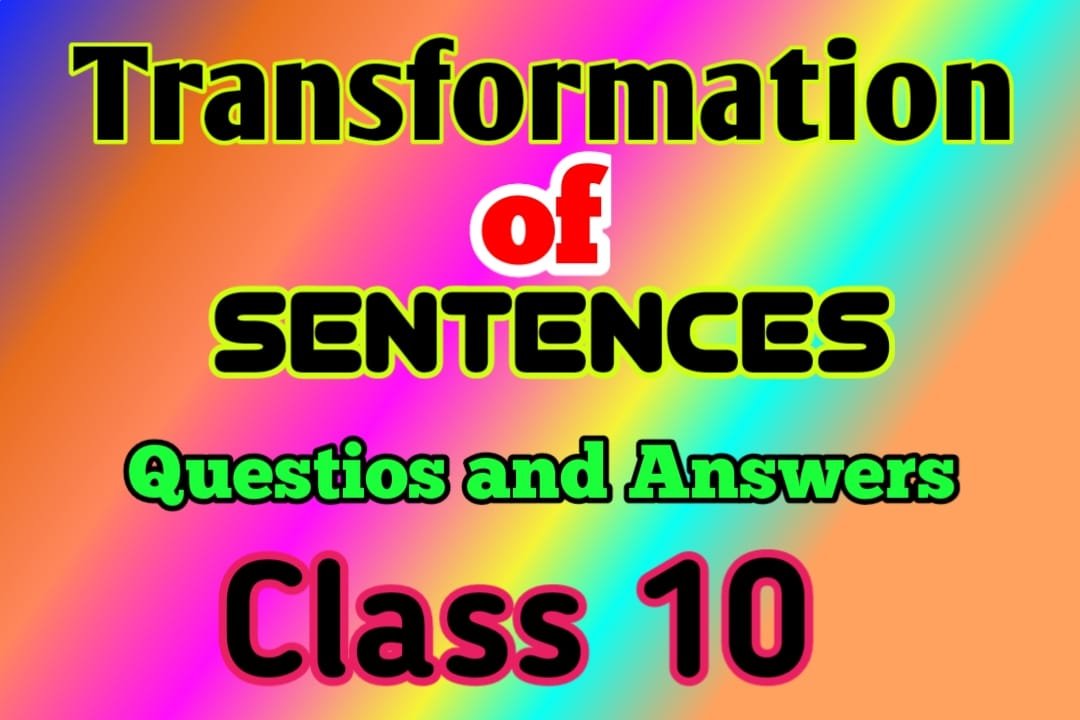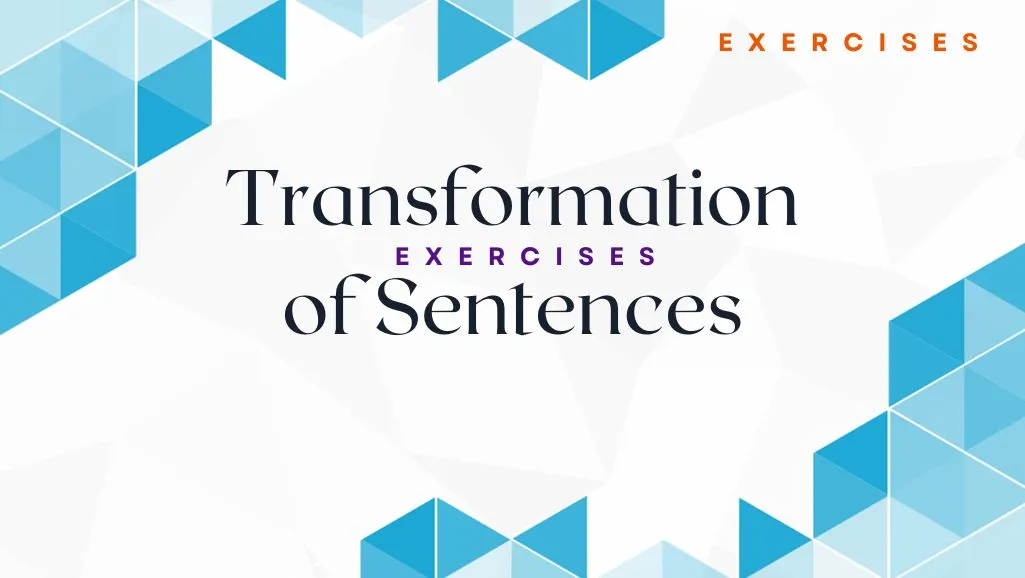Explore Transformation of Sentences Examples in this comprehensive guide. Learn how to master the art of grammatical transformation, with expert insights, FAQs, and more.
In this article, we will delve into the intricacies of the Transformation of sentence examples with rules, guiding you through the journey of mastering this essential aspect of English grammar.
What is the Transformation of Sentences?
Transformation of a Sentence involves altering the form, structure, or type of a sentence while maintaining its original meaning, a fundamental aspect of grammar. For instance, an interrogative sentence may be transformed into an assertive one without changing its meaning Follow the example:
Interrogative: Who does not know Rabindranath?
Assertive: Everybody knows Rabindranath,
In this case, it is a correct transformation of sentences examples from one form into another.
Transformation of Sentences Examples
We will explore the Transformation of Sentences Examples and Rules in the English language. This topic is crucial for anyone looking to enhance their understanding of English grammar and improve their writing skills. Let’s dive into the world of sentence transformation of Sentences Examples!
Transformation of Simple Sentences into Complex
Rule:
Simple Sentences can be transformed into complex sentences by expanding the word or phrase into a subordinate clause.
Examples:
Simple: I prayed for his recovery.
Complex: I prayed that he might recover.
Simple: He is a meritorious boy.
Complex: He is a boy who has his merit.
Simple: We went to the station by taxi to avoid missing the train.
Complex: We went to the station lest we should miss the taxi.
Simple: He pleaded for his innocence.
Complex: He pleaded that he was innocent.
Simple: I lost this pen yesterday.
Complex: This is the pen that I lost yesterday.
Simple: Being rich, he can not understand the suffering of the poor.
Complex: As he is rich he can not understand the suffering of the poor.
People also ask
Transformation of Complex Sentences into Simple
Rule:
Complex Sentences can be transformed into Simple sentences by converting different subordinate clauses into a word or phrase.
Examples
Complex: She came to my house when I was absent.
Simple: She came to my house during my absence.
Complex: He was the first man who went there.
Simple: He was the first man to go there.
Complex: He is sure that he will pass the examination.
Simple: He is sure of passing the examination.
Complex: Though he is rich, he is not happy.
Simple: In spite of his riches, he is not happy.
Complex: I saw a bird that was wounded.
Simple: I saw a wounded bird.
Complex: He confessed that he was guilty.
Simple: He confessed his guilt.
Transformation of Sentences Simple to Compound
Rule:
Simple Sentences can be transformed into compound sentences by expanding a word or a phrase into a Co-ordinate Clause using Cumulative conjunctions (and, both…and, as well as, not only … but also, etc.), Adversative conjunctions ( but, yet, still, only, however, etc.), Alternative conjunction (either…or, neither…nor, or, else, etc), and Illative conjunction (therefore, then, so, and so, for, etc)
Examples:
Simple: He is both tall and strong.
Compound: He is not only tall but also strong.
Simple: I punished the boy for his insolence.
Compound: The boy was insolent, and so I punished him.
Simple: Besides being a teacher he is a social worker.
Compound: He is a teacher and a social worker.
Simple: You must work hard to succeed.
Compound: You must work hard, or you will fail.
Transformation of Sentences Compound to Simple
Rule:
Compound Sentences can be transformed into Simple sentences by using a participle ( ing/ed/en), a prepositional phrase, infinitive.
Examples:
Compound: We must eat or we cannot live.
Simple: We must eat to live.
Compound: He tried hard, but he didn’t succeed.
Simple: In spite of his trying hard he didn’t succeed.
Compound: He not only made a promise but kept it.
Simple: Besides making a promise he kept it.
Compound: He wanted to avoid punishment and so he ran away.
Simple: He ran away to avoid punishment.
Transformation of Sentences Complex to Compound
Rule:
In complex Sentences into Compound Sentence, the Principal Clause should generally be placed last and the Sub-ordinate Cause Should be placed first.
Examples:
Complex: Though she is intelligent, she is not industrious.
Compound: She is intelligent but not industrious.
Complex: When the sun set, we returned home.
Compound: The sun set and we returned home.
Complex: Though he saw the danger, he went on.
Compound: He saw the danger, but went on.
Complex: Though she is intelligent, she is not industrious.
Compound: She is intelligent but not industrious.
Transformation of Compound to Complex
Rule:
In transforming a Compound Sentence into a Complex Sentence, the Second Clause should be made the Principal Clause and the First should be Subordinate.
Compound: Spare the rod and spoil the child.
Complex: If you spare the rod, you will spoil the child.
Compound: Do and die.
Complex: If you do, you will die.
Compound: Cross the line and you will be arrested.
Complex: If you cross the line, you will be arrested.
Compound: He is rich, but he is not happy.
Complex: Though he is rich, he is not happy.
Transformation of Affirmative into Negative
Rule:
Put a negative word with the opposite meaning after a negative word like “no”, “never” etc.
Examples
1. Affirmative: I shall always remember you.
1. Negative: I shall never forget you.
2. Affirmative: All must die.
2. Negative: None can escape death.
3. Affirmative: Everybody will admit it.
3. Negative: Nobody will deny it.
3. Affirmative: I came here for the first time.
3. Negative: I did not come here before.
People also ask
Transformation of Sentences using or omitting ‘too … to’
Rule:
The word too is an adverb. It is used to signify some extreme conditions. When an adjective is preceded by so and followed by that it is replaced by too and followed by the infinitive form of the verb that comes after it.
Examples
1. Too .. to: He is too weak to carry this bag.
1. So .. that: He is so weak that he cannot carry this bag.
2. Too .. to: They are too good not to help you.
2. So .. that: They are so good that they would help you.
3. Too .. to: This news is too good to be true.
3. So .. that: This news is so good that it cannot be true.
4. Too .. to: She is so intelligent that she will understand it.
4. So .. that: She is too intelligent not to understand it.
Transformation of Negative Sentences (using Adjectives)
Examples
1. Affirmative: He is as strong as you.
1. Negative: You are not stronger than him.
2. Affirmative: He is stronger than you.
2. Negative: You are not so strong as he.
3. Affirmative: Srijit is the best boy in the class.
3. Negative: No other boy in the class is so good as Srijit.
4. Affirmative: He is as intelligent as his brother.
4. Negative: His brother is not more intelligent than he is.
People also ask
Transformation of Sentences using ‘No sooner … than’.
Rule:
‘No sooner … than’ is used to emphasize that one action or event occurs immediately after another. It is typically followed by a past perfect tense verb. “As soon as” is a simpler and more concise alternative. It is followed by a simple past tense verb. Replace ‘No sooner … than’ with “As soon as.” Adjust the verb tense accordingly.
Examples
1. No sooner … than: No sooner did he see me than he began to weep.
1. As soon as: As soon as he saw me he began to weep.
2. No sooner … than: No sooner had we entered the room than the bell rang.
2. As soon as: As soon as we entered the room, the bell rang.
3. No sooner … than: No sooner did she see the snake than she ran off.
3. As soon as: As soon as she saw the snake she ran off.
4. No sooner … than: No sooner had the flight taken off than the tyre burst.
4. As soon as: As soon as the flight took off the tyre burst.
Transformation of Sentences using ‘none’, and ‘but’
1. Affirmative: Only students are allowed to enter the hall.
1. Negative: None but the students are allowed to enter the hall.
2. Affirmative: He must yield to necessity
2. Negative: He cannot but yield to necessity.
3. Affirmative: You are the only person fit for the post.
3. Negative: No other person but you is fit for the post.
4. Affirmative: You must take the responsibility.
4. Negative: You cannot but take the responsibility.
5. Affirmative: I like only sweets.
5. Negative: I like nothing but sweets.
.
Transformation of Sentences using double negatives
Rule:
Double negatives make an affirmative
1. Affirmative: He loves you.
1. Negative: He is not without love for you.
2. Affirmative: He tried all the plans.
2. Negative: He left no plan untried.
3. Affirmative: Everyone present cheered.
3. Negative: There was no one present who did not cheer.
4. Affirmative: We finished everything.
4. Negative: We left nothing unfinished
Transformation of Interrogative Into Assertive.
Rule:
There are many interrogative sentences that have a negative sense though no negative word is used in them. When these sentences are transformed into Assertive, a negative form is used. Similarly, interrogative sentences in the negative form having affirmative sense have to be transformed into the affirmative.
Examples
1. Interrogative: Is there any mother who does not love her child?
1. Assertive: There is no mother who does not love her child.
2. Interrogative: Can a man be truly happy in a prison?
2. Assertive: A man can never be truly happy in a prison.
3. Interrogative: Is not a black man’s blood red like a white man’s?
3. Assertive: Definitely, a black man’s blood is as red as a white man’s.
4. Interrogative: If winter comes, can spring be far behind?
4. Assertive: If winter comes, spring can not be far behind.
Transformation of Exclamatory Into Assertive.
Rule:
An exclamatory sentence expresses some strong emotions like fear, joy, wonder, terror, etc. When they are changed to Assertive ones the exclamatory form is changed into a statement.
Examples
1. Exclamatory: What a ghastly affair!
1. Assertive: The affair is ghastly indeed.
2. Exclamatory: Oh! if your father were alive today!
2. Assertive: I wish your father was alive today.
3. Exclamatory: How sweet is the sound of the piano!
3. Assertive: The sound of the piano is very sweet
4. Exclamatory: What a horrible accident!
4. Assertive: It is a most horrible accident.
FAQs
What is Sentence Transformation?
Sentence transformation involves altering the structure, form, or type of a sentence while retaining its original meaning. It’s a crucial aspect of grammar that adds versatility to your writing.
Why is Sentence Transformation Important?
Sentence transformation allows writers to convey the same message in various ways, enhancing clarity and adding stylistic diversity to their writing.
Can you provide an example of an Affirmative to Negative Transformation?
Certainly! Take an affirmative sentence like “She sings beautifully.” When transformed into the negative, it becomes “She does not sing beautifully.”
What are some common mistakes to avoid in sentence transformation?
One common mistake is altering the meaning of the sentence while transforming it. It’s essential to maintain the original message.
How can I practice and improve my sentence transformation skills?
Regular practice is key. Start with simple sentences and gradually move to more complex ones. Seek feedback to refine your skills.
Transformation of Sentences Examples and Rules is a valuable skill for anyone aiming to improve their English language proficiency. By mastering various transformation types and following essential rules, you can become a more versatile and effective communicator and writer.







